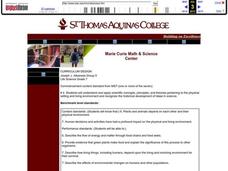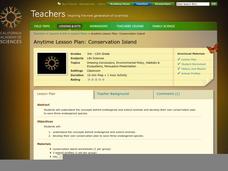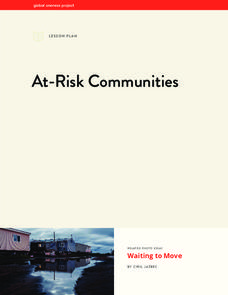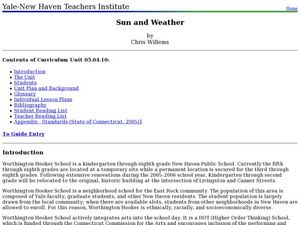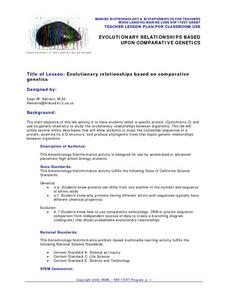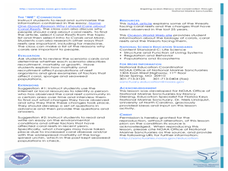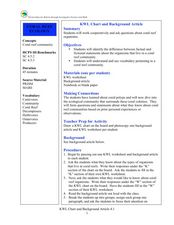Curated OER
Language Arts: Ode to the Ordinary
Eighth graders select ordinary objects, determine their uses, and write poems about them. Once they select an object, they create a web about its uses to serve as an outline. Once they have written their own odes, 8th graders meet in...
Curated OER
Plants and Animals
Seventh graders discover the interconnectedness of plants and animals in ecosystems. In groups, they create a food web and discuss the problems when one link of the chain is broken. To end the lesson, they set up a balanced environment...
California Academy of Science
Conservation Island
Why not walk in the footsteps of Teddy Roosevelt and become a conservationist? After discussing issues and reasons for animal extinction, the class creates their own conservation plans. Each small group is given mock data regarding a...
Global Oneness Project
At-Risk Communities
"Waiting to Move," a photo essay by Ciril Jazbec, brings into sharp focus the threats posed by climate change. Class members examine images of Shishmaref Island and the Native Alaskan Inupiate coastal villages that are impacted by rising...
Montana State University
Everest Extremes: Biodiversity
How many animals can live in a climate as cold as Mount Everest's? Find out with a science lesson all about biodiversity. Activities include research, presentations, group work, coloring maps, and a simulation of a food web.
Curated OER
Microfishing
Students use a simple method to collect living microorganisms from natural and/or artificial environments and develop skills in microscopy, observation, drawing, speculation, hypothesizing, oral presentation, and raising questions.
Curated OER
Praire Biome Models
Fifth graders, in groups, list the physical characteristics of a biome and think of ways in which animals might have to adapt to live there and make a biome mobile ball that show the different types of habitats that shape the praire biome.
Curated OER
Sun and Weather
How is the Earth's weather created? Middle schoolers will explain how the Sun's energy is transformed into different forms. They will perform mathematical calculations of volume, mass, and temperature. They they will explain the...
Curated OER
Let's go to the Video Tape!
Using actual data from a deep-sea video survey, high school marine biologists consider the biodiversity, compare species richness between two communities, and learn to calculate the diversity index. The lesson plan is all-inclusive,...
Energy for Keeps
Renewable Energy Action Project: What's in Your Energy Portfolio?
Uncover the renewable energy potential in your region. The activity outlines an approach to research current practices and trends. Learners conduct surveys to assess the attitudes of the local population and prepare a paper summarizing...
Curated OER
Dependence and Interdependence
Third graders explore the dependence and interdependence that plants and animals in every environment have on one another. They examine how plants and animals depend on each other for survival. Students complete a variety of experiments...
Curated OER
Evolutionary Relationships Based Upon Comparative Genetics
High schoolers investigate the protein cytochrome c in an attempt to use its genetic chemistry to study possible evolutionary relationships between organisms. The lesson integrates technology with the use computers to perform DNA analysis.
Curated OER
Soil: Food Mapping
Learners examine the concept of food mapping . In this agriculture lesson, students explore food and agriculture systems in the United States in the past and today. Learners complete food mapping activities.
Curated OER
Animals and Plants of BC's Rocky Shore: lesson 3
Young scholars create a mural of the food chain of the animals and plants of BC's rocky shore. In this food chain lesson plan, students also play a food chain matching game.
Curated OER
The Changing Coral Reef
Students record changes in the composition of a coral reef. In this Coral Reef lesson plan, students recognize the needs of Coral Reef species to survive. Students chart changes in population over time. Students write an...
Curated OER
KWL Chart and Background Article
Students discuss an ecosystem. In this coral reef lesson, students fill in their own KWL chart and contribute ideas to a whole class KWL chart. They read an article as a class to spark ideas for facts they can add to the "K" part of the...
Curated OER
Eco Points Score Card
Students play a game in which points are assigned to daily activities which require fossil fuels or electricity. They compare the impact their energy and transportation choices have in everyday life.
Curated OER
The Gaia Hypothesis: An Approach to Problem Solving in the Environment
Students are introduced to the Gaia hypothesis by examining a conceptual sketch. In groups, they analyze the way they can use Dewey's method for problem solving to solve problems within the environment. They are given a problem facing...
Curated OER
COMPOSTING: WHY BOTHER?
Students explore the composting process and participate in a contest to make the most compost the fastest from the school's kitchen and yard waste.
Curated OER
Ecosystems Connect
Students investigate ecosystems near their school and across the world. They examine both living (biotic) and non-living (abiotic) elements of each. They recognize ecosystems from various continents around the globe. The use of computers...
Curated OER
FOREST GRUMP: Examining How Deforestation Affects Plants and Animals of the Canadian Boreal
Students consider definition of an ecosystem as it relates to the Canadian boreal, discover how deforestation affects this forest and recreate ecosystems. They write persuasive letters urging politicians or business people to help save...
Curated OER
The Dirt on Worms!
Fourth graders make predictions, observe, collect and record data. They investigate several soil and worm websites. Finally, 4th graders write a letter to The President which defends earthworms by explaining their value to the United...
Curated OER
100% Recyclable
Seventh graders research recycling activities at schools across the country using e-mail. They research the waste management and recycling program at their school and problem solve to create an environmentally sound program for the future.
Curated OER
Exploring the Great Salt Lake
Third graders participate in a scavenger hunt, looking for things that are unique about the ecosystem in and around the lake. They observe and describe a variety of habitats and distinguish living and nonliving elements of...

